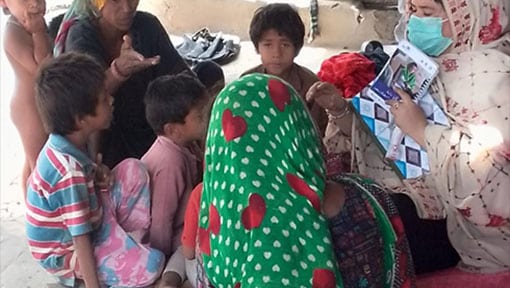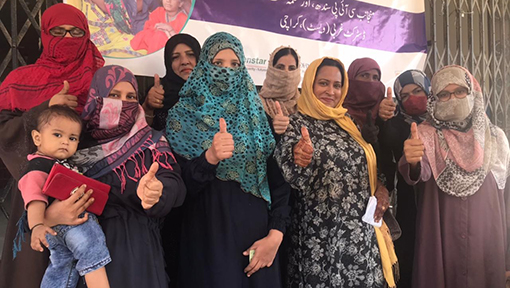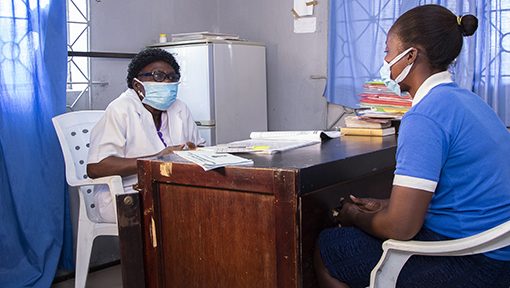TCI Participates in Africities Summit to Highlight Lack of Access to Family Planning in African Cities
Contributors: The IUSSP Team

TCI’s Njeri Nyamu (second from left) and Lekan Ajijola (far right) presented at the Africities Summit.
Rapid urban population growth in Africa is primarily due to more births than deaths in cities (natural increase) and not rural to urban migration as many think. Around 20 million women in African cities want to use family planning, but cannot access reproductive health services. Such mounting urbanization presents challenges for planning and providing physical infrastructure and social services.
During a session held May 18, 2022, at the ninth Africities Summit in Kisumu, Kenya, called “Family planning is critical to urban development: what you need to know and what you can do,” representatives from 54 African countries heard that city populations tend to be younger than in rural areas, and that millions of urban women want to space or limit their births but are unable to do so. The session was jointly coordinated by The Challenge Initiative (TCI) and the International Union for the Scientific Study of Population (IUSSP). Lekan Ajijola from TCI’s Nigeria hub and Njeri Nyamu from the East Africa hub presented on TCI’s experience working through local urban governments.
Unmet need – or women who want to stop or delay childbearing but are not using any method of contraception – ranges from one in 10 in Zimbabwe, to four in 10 in Angola. Research shows that about one-third of women in low-income settlements in Kampala, Uganda, have unmet need. In Kenya, three in 10 women face unmet need in slum areas, more than double all women living in urban areas. The barriers to access range from cultural and societal pressure on women, to poverty and discrimination, especially for those considered young or unmarried when trying to get modern contraception.
Alex Ezeh, PhD, founding Executive Director of the African Population and Health Research Center and now a professor of Global Health in the Department of Community Health and Prevention at the Dornsife School of Public Health, emphasized that:
Hard infrastructure like roads, housing, water and sanitation are important and needed in Africa’s cities. However, with the growth rate of our cities, no amount of investments will be enough, especially in secondary cities, like Kisumu, unless we understand the role fertility plays in urban growth.”
Participants were presented with success stories from TCI, which works with mayors and other elected leaders in 72 cities across nine African countries (Benin, Burkina Faso, Côte d’Ivoire, Kenya, Niger, Nigeria, Senegal, Tanzania and Uganda) to scale up high-impact family planning interventions for the urban poor. One of the key players in this is Hon. Esther Passaris, the Women Representative in Nairobi County, who presided over this important session. She said:
Political goodwill is critical to achieve zero unmet needs for contraceptives. By increasing capacity for leaders to respond to the needs of women, we can safeguard women’s human rights and guarantee their dignity, and in so doing protect the children from the ripple negative effects of unwanted and unplanned pregnancies; a vicious cycle or circle of wrongs.”
The average direct cost of supplying a modern, effective contraceptive to a couple in Africa is about $8 a year. Research shows that family planning is a low-cost way to promote urban economic development and city resilience. Ezeh shared:
Family planning is one of the most important investments you can make to improve the lives of the citizens of your city. In the longer term, it will make every shilling you spend on infrastructure, health, education and creating decent jobs go much further because the number of people requiring such services is not growing faster than your government’s ability to respond to them.”
Meeting family planning needs is associated with improved maternal, infant, and child health, increased women’s empowerment and reduced household poverty.
Watch this short video from IUSSP summarizing the session:
For assistance in reaching interviewees or more information about the session, contact: Dr. Eliphas Gitonga
For interviews in English:
- Professor Alex Ezeh
- Hon. Esther Passaris – please contact Eliphas Gitonga above to reach Hon. Passaris
For interviews in French/pour les interviews en français:
- Mme. Djenebou Diallo, Chargé de plaidoyer du Partenariat de Ouagadougou






